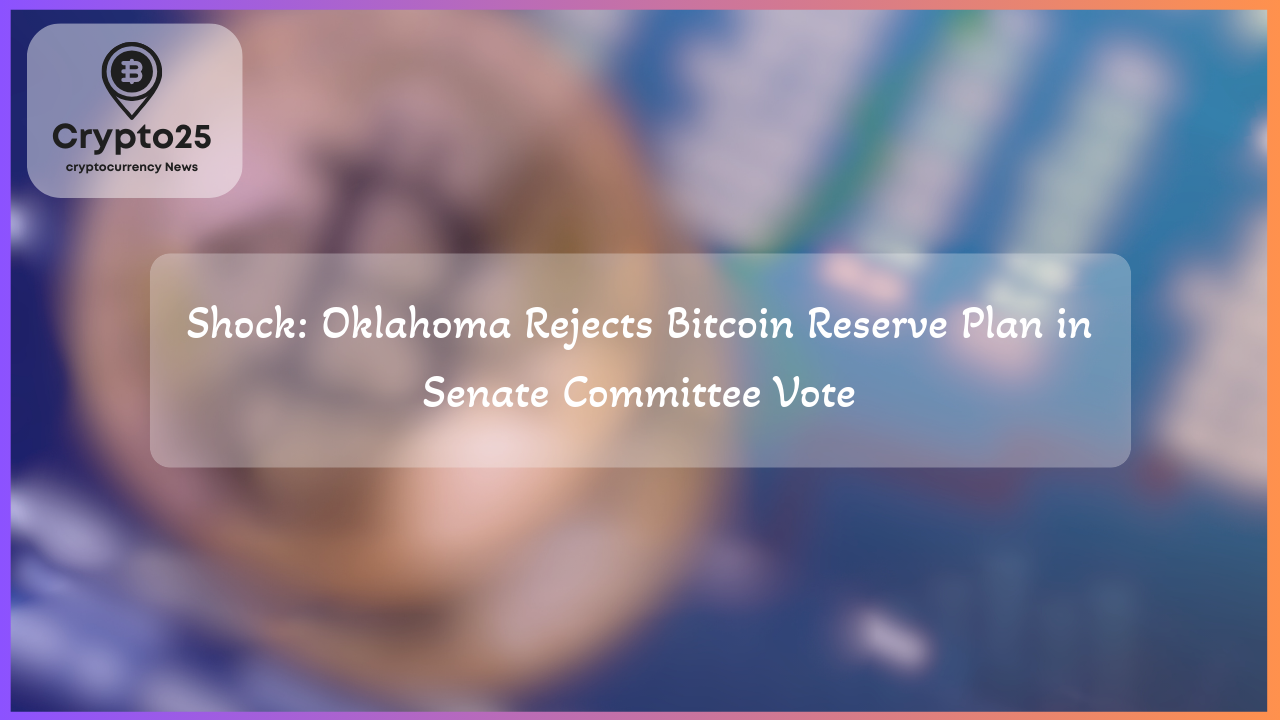
Oklahoma’s ambitious attempt to become a trailblazer among U.S. states by establishing a Bitcoin Reserve fell short this week as the state Senate’s Revenue and Taxation Committee struck down the proposal. This decision highlights the growing yet contentious debate surrounding Bitcoin’s role in state finances. As other states pursue similar initiatives, a clear picture of how digital assets could fit into government policy is beginning to emerge.
## Oklahoma’s Bitcoin Reserve Bill: A Missed Opportunity?
On Monday, the Oklahoma Senate’s Revenue and Taxation Committee narrowly voted 6-5 against House Bill 1203, also known as the Strategic Bitcoin Reserve Act. This bill, introduced in January by Representative Cody Maynard, aimed to permit the state treasurer to invest in Bitcoin and other digital assets with a market capitalization exceeding $500 billion over the last year—currently a threshold met only by Bitcoin.
Despite an encouraging initial vote, where the bill cleared an earlier committee by a 12-2 margin, it faced staunch opposition in the final stages. Republican Senators Todd Gollihare, Chuck Hall, and others sided against the plan, alongside two Democrat Senators, marking an uphill battle for Bitcoin advocates in state legislatures. Even with a last-minute change of heart by Sen. Christi Gillespie, who cited constituent outreach as the reason for her reversal, the effort wasn’t enough to push the measures forward.
The potential for a digital asset reserve isn’t just about fiscal planning but a substantial geopolitical statement, further solidifying Bitcoin as an institutional-grade investment. Nonetheless, Oklahoma’s decision signals hesitation among lawmakers about integrating cryptocurrency into state financial systems.
## Growing Momentum for State-Level Bitcoin Reserves
While Oklahoma’s efforts fizzled, other states are steadily gaining traction with policies that recognize Bitcoin’s potential as an asset class for public funds. States like Texas, Arizona, and New Hampshire are actively pursuing legislation to create Bitcoin reserves—a move that could set the stage for broader acceptance of cryptocurrencies at the state level.
Notably, New Hampshire’s House recently passed HB302 with a narrow vote of 192-179. This bill allows the state to allocate up to 10% of its general fund into Bitcoin and tangible investments like precious metals. The legislation, which now moves to the Senate, reflects growing legislative interest in diversifying state assets. Similarly, Florida’s House took a comparable step by advancing HB487, permitting Bitcoin investments for specific state accounts. In Texas, SB-21 passed with considerable support, emerging as one of the most definitive pieces of legislation promoting Bitcoin in state treasuries.
Arizona, on the other hand, stands out due to its aggressive push with two complementary bills—SB1373 and SB1025. These proposals give Arizona’s State Treasurer authority to allocate public funds to Bitcoin investments. Following committee approvals, they now await a floor vote for final consideration. Should these bills pass, Arizona could lead the Bitcoin reserve movement, signaling a shift in how U.S. states perceive and adopt emerging financial technologies.
## Bitcoin Reserves and the Broader State-Level Landscape
The race among U.S. states to implement Bitcoin reserves highlights a broader trend of cryptocurrency adoption. According to recent data from Bitcoin Laws, a total of 47 Bitcoin Reserve Bills have been introduced across 26 states, with 40 currently active in 20 states. This widespread activity underscores increasing interest in evaluating Bitcoin as a store of value for long-term public assets.
However, challenges persist. States like Montana, Pennsylvania, and Wyoming have recently rejected Bitcoin reserve proposals, largely citing concerns about volatility and regulatory uncertainty. Such setbacks illustrate the legislative hurdles for Bitcoin advocates as they attempt to bridge the gap between cryptocurrency innovation and traditional government finance systems.
Here’s a snapshot of where states stand on Bitcoin reserves:
| Title | Details |
|---|---|
| New Hampshire | 10% of funds allowed in Bitcoin investments (HB302 passed in House) |
| Arizona | Two bills advancing Bitcoin investments await a full vote |
| Florida | HB487 passed committee, focusing on digital asset investments |
| Montana | Rejected similar proposals amid market volatility concerns |
Despite varying outcomes, the overarching trend is clear: states are gradually warming to the idea of Bitcoin reserves, reflecting the broader acceptance of blockchain-based assets. Governmental integration of Bitcoin could unlock innovative pathways for funding public services and managing state wealth.
### The Road Ahead for Bitcoin Advocates
As legislative efforts unfold, Bitcoin proponents are finding their voices matter more than ever. Senator Christi Gillespie’s unexpected reversal on HB1203 after constituent input exemplifies the potential of grassroots advocacy in shaping cryptocurrency policy. With similar measures under consideration across multiple states, Bitcoin advocates need to maintain robust dialogues with lawmakers, dispel misconceptions, and push for clear regulation.
Although Oklahoma’s defeat represents a minor setback, the broader momentum for state Bitcoin reserves holds strong. As Arizona, Texas, and New Hampshire pave the way for innovation, the gradual acceptance of Bitcoin as a viable state-level reserve tool may signal a transformative era for cryptocurrency and public finances.
